-
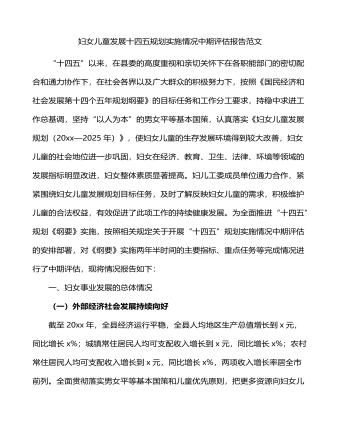
妇女儿童发展十四五规划实施情况中期评估报告(工作汇报总结)
(一)调整产业结构,大力发展经济,创造良好的就业环境随着社会转型产业升级和国家就业政策的引导支持,妇女就业问题得到缓解,但劳动力剩余导致的失业现象仍然存在。虽然县相关职能部门在这方面做了大量的工作,但这只解决了燃眉之急,没有根本解决问题。20xx年城镇登记失业人数达x万人,其中女性失业人数x万人,在失业总人数中女性占到x%。对此,我们要多开发一些适合女性就业的工作岗位,多为女性创造一些就业机会,为促进妇女的就业创造良好的政策环境。不断帮助妇女转变就业观念,鼓励她们参加免费职业培训、创业培训,使其有一技之长;积极落实如小额贷款、税收等优惠政策,促进妇女就业。(二)应健全完善未成年人保护工作的组织协调机制留守儿童缺少关爱成为重要的社会问题。随着城镇化进程的不断推进,留守儿童问题已经成为一个社会问题,而且成上升趋势。父母双方在外的留守儿童有x%以上随祖辈生活,由于父母不在身边,亲情缺失,监护不力,留守儿童几乎生活在无限制状态下。主要存在以下问题:一是身体素质不佳。
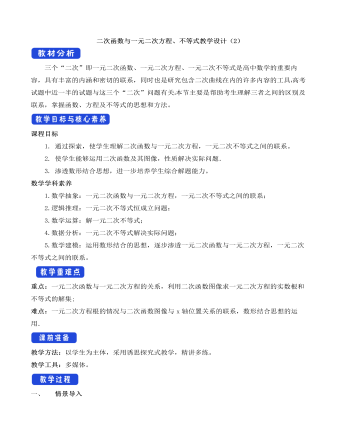
人教A版高中数学必修一二次函数与一元二次方程、不等式教学设计(2)
三个“二次”即一元二次函数、一元二次方程、一元二次不等式是高中数学的重要内容,具有丰富的内涵和密切的联系,同时也是研究包含二次曲线在内的许多内容的工具 高考试题中近一半的试题与这三个“二次”问题有关 本节主要是帮助考生理解三者之间的区别及联系,掌握函数、方程及不等式的思想和方法。课程目标1. 通过探索,使学生理解二次函数与一元二次方程,一元二次不等式之间的联系。2. 使学生能够运用二次函数及其图像,性质解决实际问题. 3. 渗透数形结合思想,进一步培养学生综合解题能力。数学学科素养1.数学抽象:一元二次函数与一元二次方程,一元二次不等式之间的联系;2.逻辑推理:一元二次不等式恒成立问题;3.数学运算:解一元二次不等式;4.数据分析:一元二次不等式解决实际问题;5.数学建模:运用数形结合的思想,逐步渗透一元二次函数与一元二次方程,一元二次不等式之间的联系。
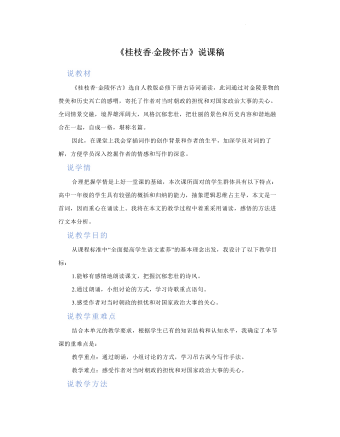
古诗词诵读《桂枝香?金陵怀古》说课稿(一) 2021-2022学年统编版高中语文必修下册
王安石,字介甫,号半山。北宋著名政治家、思想家、文学家、改革家,唐宋八大家之一。欧阳修称赞王安石:“翰林风月三千首,吏部文章二百年。老去自怜心尚在,后来谁与子争先。”传世文集有《王临川集》、《临川集拾遗》等。其诗文各体兼擅,词虽不多,但亦擅长,世人哄传之诗句莫过于《泊船瓜洲》中的“春风又绿江南岸,明月何时照我还。”且有名作《桂枝香》等。介绍之后设置这样的导入语:今天我们共同走进王安石,一起欣赏名作《桂枝香·金陵怀古》。(板书标题)(二)整体感知整体感知是赏析文章的前提,通过初读,可以使学生初步了解将要学到的基本内容,了解文章大意及思想意图,使学生对课文内容形成整体感知。首先,我会让学生根据课前预习,出声诵读课文,同时注意朗读的快慢、停顿、语调、轻重音等,然后再播放音频,纠正他们的读音与停顿。其次,我会引导学生谈谈他感受。学生通过朗读,能够说出本词雄壮、豪放、有气势,有对景物的赞美和对历史的感喟。

古诗词诵读《拟行路难(其四)》说课稿 2021-2022学年统编版高中语文选择性必修下册
(一)导入新课“时势造英雄”,恶劣的环境造就名诗名篇。正因如此,怀才不遇于古人是恒久的情感素材。同学们,请大家回忆我们学过哪些抒发作者怀才不遇的诗词?(二)解释题意拟:仿照,模拟《行路难》,是乐府杂曲,本为汉代歌谣,晋人袁山松改变其音调,创制新词,流行一时。 鲍照《拟行路难》共十八首,歌咏人世的种种忧虑,寄寓悲愤,今天我们学习的是其中第四首。(三)作者简介、写作背景门阀制度之下,“上品无寒门,下品无世族”,出身寒微的文人往往空怀一腔热忱,却报国无门,不得不在壮志未酬的遗恨中坐视时光流逝。即使跻身仕途,也多是充当幕僚、府掾,备受压抑,在困顿坎坷中徒然挣扎,只落得身心交瘁。
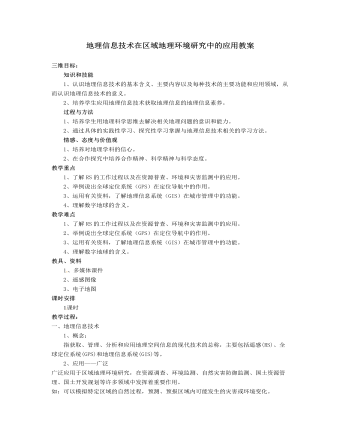
人教版高中地理必修3地理信息技术在区域地理环境研究中的应用教案
1.从监测的范围、速度,人力和财力的投入等方面看,遥感具有哪些特点?点拨:范围更广、速度更快、需要人力更少 、财力投入少。2.有人说:遥感是人的视力的延伸。你同意这种看法吗?点拨:同意。可以从遥感的定义分析。从某种意义上说,人们“看”的过程就是在遥感,眼睛相当于传感器。课堂小结:遥感技术是国土整治和区域发展研究中应用较广的技术 手段之一,我国在这个领域已经走在了世界的前列。我国的大部分土地已经获得了大比例尺的航空影像资料,成功发射了回收式国土资源卫星,自行研制发射了“风云”卫星。遥感技术为我国自然资源开发与利用提供 了大量的有用的资料,在我国农业估产、灾害监测 、矿产勘察、土地利用、环境管理与城乡规划中起到了非常重要的作用。板书设计§1.2地理信息技术在区域地理环境研究中的应用

双曲线的简单几何性质(2)教学设计人教A版高中数学选择性必修第一册
二、典例解析例4.如图,双曲线型冷却塔的外形,是双曲线的一部分,已知塔的总高度为137.5m,塔顶直径为90m,塔的最小直径(喉部直径)为60m,喉部标高112.5m,试建立适当的坐标系,求出此双曲线的标准方程(精确到1m)解:设双曲线的标准方程为 ,如图所示:为喉部直径,故 ,故双曲线方程为 .而 的横坐标为塔顶直径的一半即 ,其纵坐标为塔的总高度与喉部标高的差即 ,故 ,故 ,所以 ,故双曲线方程为 .例5.已知点 到定点 的距离和它到定直线l: 的距离的比是 ,则点 的轨迹方程为?解:设点 ,由题知, ,即 .整理得: .请你将例5与椭圆一节中的例6比较,你有什么发现?例6、 过双曲线 的右焦点F2,倾斜角为30度的直线交双曲线于A,B两点,求|AB|.分析:求弦长问题有两种方法:法一:如果交点坐标易求,可直接用两点间距离公式代入求弦长;法二:但有时为了简化计算,常设而不求,运用韦达定理来处理.解:由双曲线的方程得,两焦点分别为F1(-3,0),F2(3,0).因为直线AB的倾斜角是30°,且直线经过右焦点F2,所以,直线AB的方程为
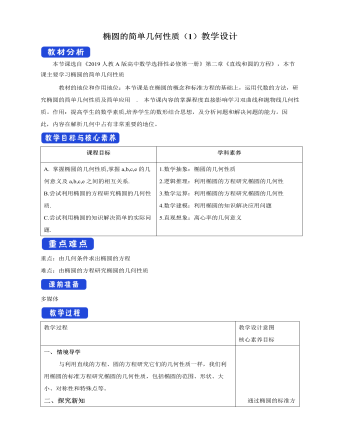
椭圆的简单几何性质(1)教学设计人教A版高中数学选择性必修第一册
1.判断 (1)椭圆x^2/a^2 +y^2/b^2 =1(a>b>0)的长轴长是a. ( )(2)若椭圆的对称轴为坐标轴,长轴长与短轴长分别为10,8,则椭圆的方程为x^2/25+y^2/16=1. ( )(3)设F为椭圆x^2/a^2 +y^2/b^2 =1(a>b>0)的一个焦点,M为其上任一点,则|MF|的最大值为a+c(c为椭圆的半焦距). ( )答案:(1)× (2)× (3)√ 2.已知椭圆C:x^2/a^2 +y^2/4=1的一个焦点为(2,0),则C的离心率为( )A.1/3 B.1/2 C.√2/2 D.(2√2)/3解析:∵a2=4+22=8,∴a=2√2.∴e=c/a=2/(2√2)=√2/2.故选C.答案:C 三、典例解析例1已知椭圆C1:x^2/100+y^2/64=1,设椭圆C2与椭圆C1的长轴长、短轴长分别相等,且椭圆C2的焦点在y轴上.(1)求椭圆C1的半长轴长、半短轴长、焦点坐标及离心率;(2)写出椭圆C2的方程,并研究其性质.解:(1)由椭圆C1:x^2/100+y^2/64=1,可得其半长轴长为10,半短轴长为8,焦点坐标为(6,0),(-6,0),离心率e=3/5.(2)椭圆C2:y^2/100+x^2/64=1.性质如下:①范围:-8≤x≤8且-10≤y≤10;②对称性:关于x轴、y轴、原点对称;③顶点:长轴端点(0,10),(0,-10),短轴端点(-8,0),(8,0);④焦点:(0,6),(0,-6);⑤离心率:e=3/5.
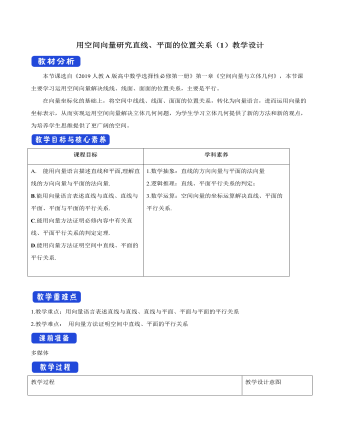
用空间向量研究直线、平面的位置关系(1)教学设计人教A版高中数学选择性必修第一册
二、探究新知一、空间中点、直线和平面的向量表示1.点的位置向量在空间中,我们取一定点O作为基点,那么空间中任意一点P就可以用向量(OP) ?来表示.我们把向量(OP) ?称为点P的位置向量.如图.2.空间直线的向量表示式如图①,a是直线l的方向向量,在直线l上取(AB) ?=a,设P是直线l上的任意一点,则点P在直线l上的充要条件是存在实数t,使得(AP) ?=ta,即(AP) ?=t(AB) ?.如图②,取定空间中的任意一点O,可以得到点P在直线l上的充要条件是存在实数t,使(OP) ?=(OA) ?+ta, ①或(OP) ?=(OA) ?+t(AB) ?. ②①式和②式都称为空间直线的向量表示式.由此可知,空间任意直线由直线上一点及直线的方向向量唯一确定.1.下列说法中正确的是( )A.直线的方向向量是唯一的B.与一个平面的法向量共线的非零向量都是该平面的法向量C.直线的方向向量有两个D.平面的法向量是唯一的答案:B 解析:由平面法向量的定义可知,B项正确.
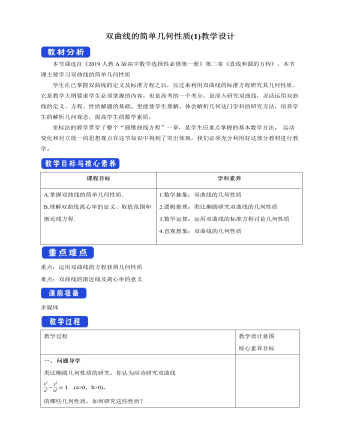
双曲线的简单几何性质(1)教学设计人教A版高中数学选择性必修第一册
问题导学类比椭圆几何性质的研究,你认为应该研究双曲线x^2/a^2 -y^2/b^2 =1 (a>0,b>0),的哪些几何性质,如何研究这些性质1、范围利用双曲线的方程求出它的范围,由方程x^2/a^2 -y^2/b^2 =1可得x^2/a^2 =1+y^2/b^2 ≥1 于是,双曲线上点的坐标( x , y )都适合不等式,x^2/a^2 ≥1,y∈R所以x≥a 或x≤-a; y∈R2、对称性 x^2/a^2 -y^2/b^2 =1 (a>0,b>0),关于x轴、y轴和原点都是对称。x轴、y轴是双曲线的对称轴,原点是对称中心,又叫做双曲线的中心。3、顶点(1)双曲线与对称轴的交点,叫做双曲线的顶点 .顶点是A_1 (-a,0)、A_2 (a,0),只有两个。(2)如图,线段A_1 A_2 叫做双曲线的实轴,它的长为2a,a叫做实半轴长;线段B_1 B_2 叫做双曲线的虚轴,它的长为2b,b叫做双曲线的虚半轴长。(3)实轴与虚轴等长的双曲线叫等轴双曲线4、渐近线(1)双曲线x^2/a^2 -y^2/b^2 =1 (a>0,b>0),的渐近线方程为:y=±b/a x(2)利用渐近线可以较准确的画出双曲线的草图
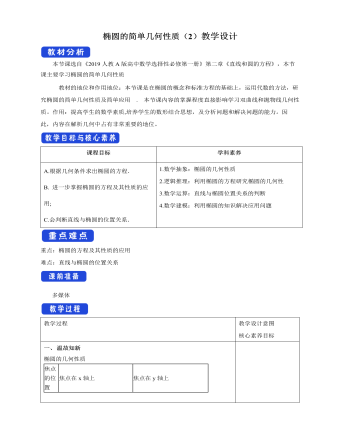
椭圆的简单几何性质(2)教学设计人教A版高中数学选择性必修第一册
二、典例解析例5. 如图,一种电影放映灯的反射镜面是旋转椭圆面(椭圆绕其对称轴旋转一周形成的曲面)的一部分。过对称轴的截口 ABC是椭圆的一部分,灯丝位于椭圆的一个焦点F_1上,片门位另一个焦点F_2上,由椭圆一个焦点F_1 发出的光线,经过旋转椭圆面反射后集中到另一个椭圆焦点F_2,已知 〖BC⊥F_1 F〗_2,|F_1 B|=2.8cm, |F_1 F_2 |=4.5cm,试建立适当的平面直角坐标系,求截口ABC所在的椭圆方程(精确到0.1cm)典例解析解:建立如图所示的平面直角坐标系,设所求椭圆方程为x^2/a^2 +y^2/b^2 =1 (a>b>0) 在Rt ΔBF_1 F_2中,|F_2 B|= √(|F_1 B|^2+|F_1 F_2 |^2 )=√(〖2.8〗^2 〖+4.5〗^2 ) 有椭圆的性质 , |F_1 B|+|F_2 B|=2 a, 所以a=1/2(|F_1 B|+|F_2 B|)=1/2(2.8+√(〖2.8〗^2 〖+4.5〗^2 )) ≈4.1b= √(a^2 〖-c〗^2 ) ≈3.4所以所求椭圆方程为x^2/〖4.1〗^2 +y^2/〖3.4〗^2 =1 利用椭圆的几何性质求标准方程的思路1.利用椭圆的几何性质求椭圆的标准方程时,通常采用待定系数法,其步骤是:(1)确定焦点位置;(2)设出相应椭圆的标准方程(对于焦点位置不确定的椭圆可能有两种标准方程);(3)根据已知条件构造关于参数的关系式,利用方程(组)求参数,列方程(组)时常用的关系式有b2=a2-c2等.
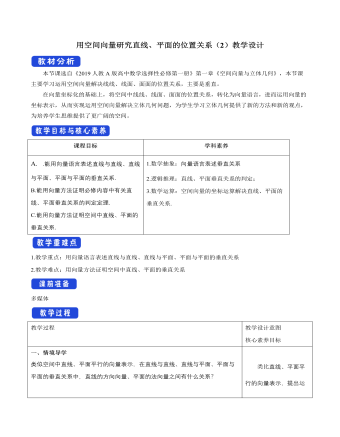
用空间向量研究直线、平面的位置关系(2)教学设计人教A版高中数学选择性必修第一册
跟踪训练1在正方体ABCD-A1B1C1D1中,E为AC的中点.求证:(1)BD1⊥AC;(2)BD1⊥EB1.(2)∵(BD_1 ) ?=(-1,-1,1),(EB_1 ) ?=(1/2 "," 1/2 "," 1),∴(BD_1 ) ?·(EB_1 ) ?=(-1)×1/2+(-1)×1/2+1×1=0,∴(BD_1 ) ?⊥(EB_1 ) ?,∴BD1⊥EB1.证明:以D为原点,DA,DC,DD1所在直线分别为x轴、y轴、z轴,建立如图所示的空间直角坐标系.设正方体的棱长为1,则B(1,1,0),D1(0,0,1),A(1,0,0),C(0,1,0),E(1/2 "," 1/2 "," 0),B1(1,1,1).(1)∵(BD_1 ) ?=(-1,-1,1),(AC) ?=(-1,1,0),∴(BD_1 ) ?·(AC) ?=(-1)×(-1)+(-1)×1+1×0=0.∴(BD_1 ) ?⊥(AC) ?,∴BD1⊥AC.例2在棱长为1的正方体ABCD-A1B1C1D1中,E,F,M分别为棱AB,BC,B1B的中点.求证:D1M⊥平面EFB1.思路分析一种思路是不建系,利用基向量法证明(D_1 M) ?与平面EFB1内的两个不共线向量都垂直,从而根据线面垂直的判定定理证得结论;另一种思路是建立空间直角坐标系,通过坐标运算证明(D_1 M) ?与平面EFB1内的两个不共线向量都垂直;还可以在建系的前提下,求得平面EFB1的法向量,然后说明(D_1 M) ?与法向量共线,从而证得结论.证明:(方法1)因为E,F,M分别为棱AB,BC,B1B的中点,所以(D_1 M) ?=(D_1 B_1 ) ?+(B_1 M) ?=(DA) ?+(DC) ?+1/2 (B_1 B) ?,而(B_1 E) ?=(B_1 B) ?+(BE) ?=(B_1 B) ?-1/2 (DC) ?,于是(D_1 M) ?·(B_1 E) ?=((DA) ?+(DC) ?+1/2 (B_1 B) ?)·((B_1 B) ?-1/2 (DC) ?)=0-0+0-1/2+1/2-1/4×0=0,因此(D_1 M) ?⊥(B_1 E) ?.同理(D_1 M) ?⊥(B_1 F) ?,又因为(B_1 E) ?,(B_1 F) ?不共线,因此D1M⊥平面EFB1.
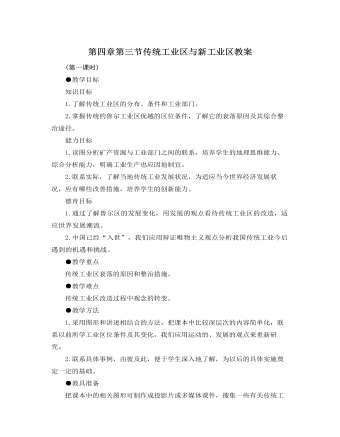
人教版新课标高中地理必修2第四章第三节传统工业区与新工业区教案
知识目标1.了解传统工业区的分布、条件和工业部门。2.掌握传统的鲁尔工业区优越的区位条件,了解它的衰落原因及其综合整治途径。能力目标1.读图分析矿产资源与工业部门之间的联系,培养学生的地理思维能力、综合分析能力,明确工业生产也应因地制宜。2.联系实际,了解当地传统工业发展状况,为适应当今世界经济发展状况,应有哪些改善措施,培养学生的创新能力。德育目标1.通过了解鲁尔区的发展变化,用发展的观点看待传统工业区的改造,适应世界发展潮流。2.中国已经“入世”,我们应用辩证唯物主义观点分析我国传统工业今后遇到的机遇和挑战。
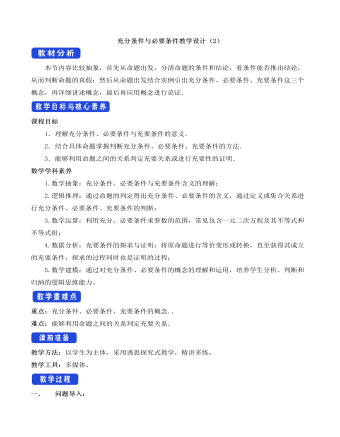
人教A版高中数学必修一充分条件与必要条件教学设计(2)
【例3】本例中“p是q的充分不必要条件”改为“p是q的必要不充分条件”,其他条件不变,试求m的取值范围.【答案】见解析【解析】由x2-8x-20≤0得-2≤x≤10,由x2-2x+1-m2≤0(m>0)得1-m≤x≤1+m(m>0)因为p是q的必要不充分条件,所以q?p,且p?/q.则{x|1-m≤x≤1+m,m>0}?{x|-2≤x≤10}所以m>01-m≥-21+m≤10,解得0<m≤3.即m的取值范围是(0,3].解题技巧:(利用充分、必要、充分必要条件的关系求参数范围)(1)化简p、q两命题,(2)根据p与q的关系(充分、必要、充要条件)转化为集合间的关系,(3)利用集合间的关系建立不等关系,(4)求解参数范围.跟踪训练三3.已知P={x|a-4<x<a+4},Q={x|1<x<3},“x∈P”是“x∈Q”的必要条件,求实数a的取值范围.【答案】见解析【解析】因为“x∈P”是x∈Q的必要条件,所以Q?P.所以a-4≤1a+4≥3解得-1≤a≤5即a的取值范围是[-1,5].五、课堂小结让学生总结本节课所学主要知识及解题技巧
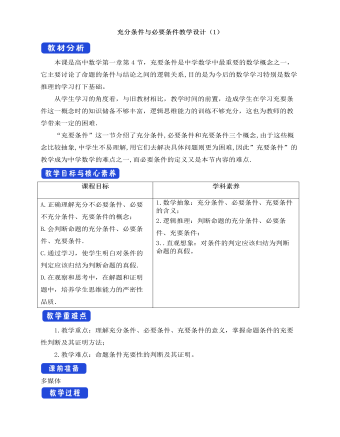
人教A版高中数学必修一充分条件与必要条件教学设计(1)
本课是高中数学第一章第4节,充要条件是中学数学中最重要的数学概念之一, 它主要讨论了命题的条件与结论之间的逻辑关系,目的是为今后的数学学习特别是数学推理的学习打下基础。从学生学习的角度看,与旧教材相比,教学时间的前置,造成学生在学习充要条件这一概念时的知识储备不够丰富,逻辑思维能力的训练不够充分,这也为教师的教学带来一定的困难.“充要条件”这一节介绍了充分条件,必要条件和充要条件三个概念,由于这些概念比较抽象,中学生不易理解,用它们去解决具体问题则更为困难,因此”充要条件”的教学成为中学数学的难点之一,而必要条件的定义又是本节内容的难点.A.正确理解充分不必要条件、必要不充分条件、充要条件的概念;B.会判断命题的充分条件、必要条件、充要条件.C.通过学习,使学生明白对条件的判定应该归结为判断命题的真假.D.在观察和思考中,在解题和证明题中,培养学生思维能力的严密性品质.
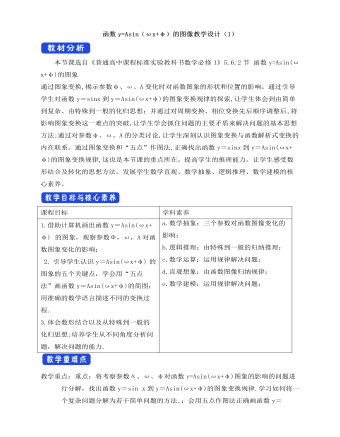
人教A版高中数学必修一函数y=Asin(ωχ+φ)教学设计(1)
本节课选自《普通高中课程标准实验教科书数学必修1》5.6.2节 函数y=Asin(ωx+φ)的图象通过图象变换,揭示参数φ、ω、A变化时对函数图象的形状和位置的影响。通过引导学生对函数y=sinx到y=Asin(ωx+φ)的图象变换规律的探索,让学生体会到由简单到复杂、由特殊到一般的化归思想;并通过对周期变换、相位变换先后顺序调整后,将影响图象变换这一难点的突破,让学生学会抓住问题的主要矛盾来解决问题的基本思想方法;通过对参数φ、ω、A的分类讨论,让学生深刻认识图象变换与函数解析式变换的内在联系。通过图象变换和“五点”作图法,正确找出函数y=sinx到y=Asin(ωx+φ)的图象变换规律,这也是本节课的重点所在。提高学生的推理能力。让学生感受数形结合及转化的思想方法。发展学生数学直观、数学抽象、逻辑推理、数学建模的核心素养。

人教A版高中数学必修一等式性质与不等式性质教学设计(2)
等式性质与不等式性质是高中数学的主要内容之一,在高中数学中占有重要地位,它是刻画现实世界中量与量之间关系的有效数学模型,在现实生活中有着广泛的应,有着重要的实际意义.同时等式性质与不等式性质也为学生以后顺利学习基本不等式起到重要的铺垫.课程目标1. 掌握等式性质与不等式性质以及推论,能够运用其解决简单的问题.2. 进一步掌握作差、作商、综合法等比较法比较实数的大小. 3. 通过教学培养学生合作交流的意识和大胆猜测、乐于探究的良好思维品质。数学学科素养1.数学抽象:不等式的基本性质;2.逻辑推理:不等式的证明;3.数学运算:比较多项式的大小及重要不等式的应用;4.数据分析:多项式的取值范围,许将单项式的范围之一求出,然后相加或相乘.(将减法转化为加法,将除法转化为乘法);5.数学建模:运用类比的思想有等式的基本性质猜测不等式的基本性质。
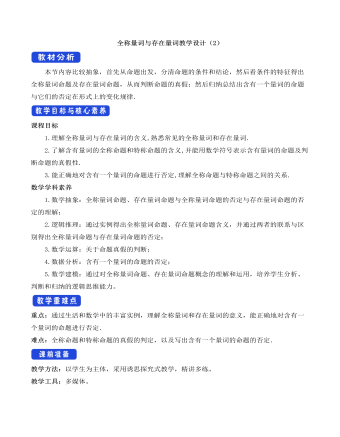
人教A版高中数学必修一全称量词与存在量词教学设计(2)
(4)“不论m取何实数,方程x2+2x-m=0都有实数根”是全称量词命题,其否定为“存在实数m0,使得方程x2+2x-m0=0没有实数根”,它是真命题.解题技巧:(含有一个量词的命题的否定方法)(1)一般地,写含有一个量词的命题的否定,首先要明确这个命题是全称量词命题还是存在量词命题,并找到其量词的位置及相应结论,然后把命题中的全称量词改成存在量词,存在量词改成全称量词,同时否定结论.(2)对于省略量词的命题,应先挖掘命题中隐含的量词,改写成含量词的完整形式,再依据规则来写出命题的否定.跟踪训练三3.写出下列命题的否定,并判断其真假:(1)p:?x∈R,x2-x+ ≥0;(2)q:所有的正方形都是矩形;(3)r:?x∈R,x2+3x+7≤0;(4)s:至少有一个实数x,使x3+1=0.【答案】见解析【解析】(1) p:?x∈R,x2-x+1/4<0.∵?x∈R,x2-x+1/4=(x"-" 1/2)^2≥0恒成立,∴ p是假命题.
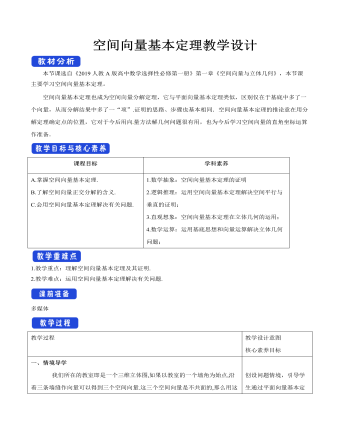
空间向量基本定理教学设计人教A版高中数学选择性必修第一册
反思感悟用基底表示空间向量的解题策略1.空间中,任一向量都可以用一个基底表示,且只要基底确定,则表示形式是唯一的.2.用基底表示空间向量时,一般要结合图形,运用向量加法、减法的平行四边形法则、三角形法则,以及数乘向量的运算法则,逐步向基向量过渡,直至全部用基向量表示.3.在空间几何体中选择基底时,通常选取公共起点最集中的向量或关系最明确的向量作为基底,例如,在正方体、长方体、平行六面体、四面体中,一般选用从同一顶点出发的三条棱所对应的向量作为基底.例2.在棱长为2的正方体ABCD-A1B1C1D1中,E,F分别是DD1,BD的中点,点G在棱CD上,且CG=1/3 CD(1)证明:EF⊥B1C;(2)求EF与C1G所成角的余弦值.思路分析选择一个空间基底,将(EF) ?,(B_1 C) ?,(C_1 G) ?用基向量表示.(1)证明(EF) ?·(B_1 C) ?=0即可;(2)求(EF) ?与(C_1 G) ?夹角的余弦值即可.(1)证明:设(DA) ?=i,(DC) ?=j,(DD_1 ) ?=k,则{i,j,k}构成空间的一个正交基底.

倾斜角与斜率教学设计人教A版高中数学选择性必修第一册
(2)l的倾斜角为90°,即l平行于y轴,所以m+1=2m,得m=1.延伸探究1 本例条件不变,试求直线l的倾斜角为锐角时实数m的取值范围.解:由题意知(m"-" 1"-" 1)/(m+1"-" 2m)>0,解得1<m<2.延伸探究2 若将本例中的“N(2m,1)”改为“N(3m,2m)”,其他条件不变,结果如何?解:(1)由题意知(m"-" 1"-" 2m)/(m+1"-" 3m)=1,解得m=2.(2)由题意知m+1=3m,解得m=1/2.直线斜率的计算方法(1)判断两点的横坐标是否相等,若相等,则直线的斜率不存在.(2)若两点的横坐标不相等,则可以用斜率公式k=(y_2 "-" y_1)/(x_2 "-" x_1 )(其中x1≠x2)进行计算.金题典例 光线从点A(2,1)射到y轴上的点Q,经y轴反射后过点B(4,3),试求点Q的坐标及入射光线的斜率.解:(方法1)设Q(0,y),则由题意得kQA=-kQB.∵kQA=(1"-" y)/2,kQB=(3"-" y)/4,∴(1"-" y)/2=-(3"-" y)/4.解得y=5/3,即点Q的坐标为 0,5/3 ,∴k入=kQA=(1"-" y)/2=-1/3.(方法2)设Q(0,y),如图,点B(4,3)关于y轴的对称点为B'(-4,3), kAB'=(1"-" 3)/(2+4)=-1/3,由题意得,A、Q、B'三点共线.从而入射光线的斜率为kAQ=kAB'=-1/3.所以,有(1"-" y)/2=(1"-" 3)/(2+4),解得y=5/3,点Q的坐标为(0,5/3).
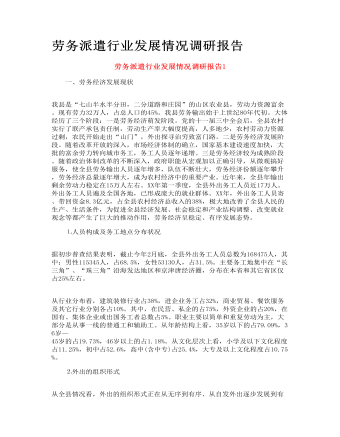
劳务派遣行业发展情况调研报告
⒈人员构成及务工地点分布状况 据初步普查结果表明,截止今年2月底,全县外出务工人员总数为168475人,其中:男性115345人,占68.5%,女性53130人,占31.5%。主要务工地集中在“长三角”、“珠三角”沿海发达地区和京津唐经济圈,分布在本省和其它省区仅占25%左右。 从行业分布看,建筑装修行业占38%,进企业务工占32%,商业贸易、餐饮服务及其它行业分别各占10%。其中,在民营、私企的占75%,外资企业的占20%,在国有、集体企业或出国务工者总数占5%。职业主要以简单和重复劳动为主,大部分是从事一线的普通工和辅助工。从年龄结构上看,35岁以下的占79.09%,36岁—45岁的占19.73%,46岁以上的占1.18%。从文化层次上看,小学及以下文化程度占11.25%,初中占52.6%,高中(含中专)占25.4%,大专及以上文化程度占10.75%。


